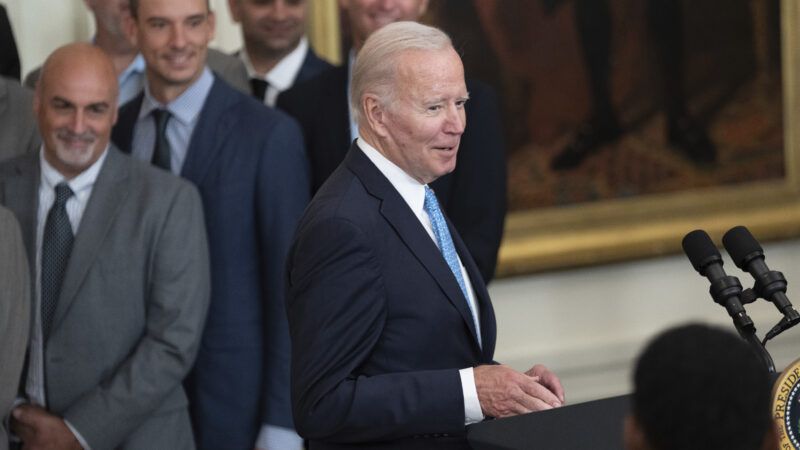'Flagrantly Illegal': Law Firm Files Lawsuit To Stop Biden's Student Loan Forgiveness
"This isn't how laws are supposed to be made," says Caleb Kruckenberg, an attorney with the Pacific Legal Foundation.

President Joe Biden's plan to forgive hundreds of billions of dollars in student loan debt violates both federal law and the Constitution, according to a just-filed lawsuit from the Pacific Legal Foundation (PLF), a libertarian law firm.
"This isn't how laws are supposed to be made," Caleb Kruckenberg, an attorney for PLF, tells Reason. "Only Congress has the power to pass laws and spend money under the Constitution. The administration's actions here are flagrantly illegal."
This is the first serious challenge to Biden's student loan forgiveness plan, which he announced last month. The lawsuit's plaintiff is Frank Garrison, who's also an attorney at PLF. Garrison borrowed federal student loans to pay for law school, but according to him, Biden's debt forgiveness plan will actually subject him to a financial penalty in the form of a state tax. This gives him standing to sue the U.S. Education Department, his lawsuit argues.
"Despite the staggering scope of this regulatory action, it was taken with breathtaking informality and opacity," the lawsuit claims. "In the rush, the administration has created new problems for borrowers in at least six states that tax loan cancellation as income."
According to Garrison, he is already receiving debt relief under Public Service Loan Forgiveness (PSLF), a federal program for borrowers who work in public service at nonprofit organizations. Qualifying borrowers who make a certain number of payments and meet maximum income requirements can have the rest of their debts forgiven by PSLF. Garrison expects to qualify in about four years.
Importantly, debt relief under PSLF is not subject to state taxes. Biden's broad forgiveness plan, however, will be taxed as income in Indiana—where Garrison resides—as well as Wisconsin, North Carolina, Minnesota, Mississippi, and Arkansas. Garrison will be "stuck with a tax bill that makes him financially worse off than continuing with his repayment program under PSLF," according to the lawsuit. "He did not ask for cancellation, doesn't want it, and has no way to opt out of it."
"The administration's slapdash, lawmaking-by-press-release approach to student debt cancellation threatens to leave tens of thousands of borrowers stuck with a tax bill on money they'll never see in states like Indiana, where it will be taxed as income," says Kruckenberg.
While the Pacific Legal Foundation's theory is that this gives Garrison standing to sue the Education Department, the lawsuit's case against the Biden forgiveness plan is more straightforward: PLF is arguing that Biden has violated both the Constitution and the Administrative Procedure Act, which give Congress rather than the president the power to make new regulations.
Biden's new plan will forgive up to $20,000 worth of debt for many borrowers. The plan could cost U.S. taxpayers anywhere between $300 billion and a trillion dollars. A low estimate of the cost per individual taxpayer is $2,100.
The administration has claimed that it has the power to unilaterally forgive student loan debts without consulting Congress. As justification, Biden has cited 2003's Higher Education Relief Opportunities for Students, or HEROES Act. This law gave the president some authority to cancel or delay student loan repayments during national emergencies, with the clear intention of offering relief to borrowers who were serving in combat operations during the war on terror. Biden's view is that the COVID-19 pandemic counts as a national emergency, even though he has now declared it definitively "over."
PLF's lawsuit takes issue with the pandemic justification for debt relief, noting that the harms purportedly ameliorated with debt forgiveness are not a "direct result" of the "national emergency," as required by the HEROES Act.
"To the extent the statute can arguably justify the cancellation, the major questions doctrine requires a clear authorization by Congress of such an economically and politically significant action, which is lacking here," the lawsuit argues.
Loan forgiveness is set to kick in sometime next month.

Show Comments (114)